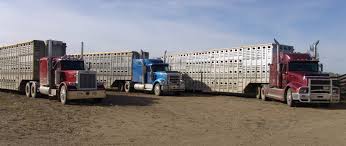WASHINGTON (May 23, 2018) – The National Cattlemen’s Beef Association today applauded the introduction of the Transporting Livestock Across America Safely (TLAAS) Act, saying it would reform federal Hours of Service (HOS) rules in a way that ensures animal welfare, highway safety, and the well-being of livestock haulers. The bill was introduced today by U.S. Sens. Ben Sasse of Nebraska, Heidi Heitkamp of North Dakota, Jerry Moran of Kansas, John Hoeven of North Dakota, Jon Tester of Montana, Joni Ernst of Iowa, Marco Rubio of Florida, Tina Smith of Minnesota, Pat Roberts of Kansas, and Rand Paul of Kentucky.
“The current Hours of Service rules for livestock haulers present big challenges for our industry and can often jeopardize the health and well-being of livestock,” said NCBA President and fifth-generation California rancher Kevin Kester. “Hauling livestock is inherently different than hauling products like paper towels or bottles of water. Live cattle can’t simply be left unattended in a trailer – especially in very hot or cold weather – for extended periods of time, and this bill takes that into account. Senator Sasse deserves a lot of credit for his leadership on this issue, and we thank all of the original cosponsors who stepped up to show their support for livestock haulers and cattle producers across this country.”
Livestock haulers are scheduled to have to start using Electronic Logging Devices (
The TLAAS Act takes into full consideration the fact that there are living and breathing animals on the trailer that must be kept moving, and that they must get to their destination as quickly and as safely as possible. This bill provides for more drive time for livestock haulers, as well as granting the flexibility for drivers to rest at any point during the trip without the break counting against HOS time. This bill also allows for another 150 air mile exemption on the back end of a livestock haul to account for the wait time that occurs when unloading live animals.
“Given the unique nature of livestock hauling – often very long distances between cow-calf operations and feedlots or processing facilities – and the fact that we’re transporting live animals that must be treated humanely – this legislation is vitally important and I think it strikes a balance coupled with common sense for everybody involved,” Kester added. “I hope Congress will pass this bill as quickly as possible so we can have this issue resolved before the ELD mandate for livestock haulers goes into effect on Oct.1.”
The United States Cattlemen's Association also praised the introduction of the bill. USCA Transportation Committee Chairman Steve Hilker issued the following statement:
“We asked, and Congress answered. This is a historic moment for livestock and insect haulers to finally be afforded needed flexibility in the restrictive Hours-of-Service (HOS) rules. We commend this bipartisan group of Senators, led by Sen. Sasse, for working with the industry towards a common-sense solution. Thank you to everyone who has put in many hours, many miles and many late nights to get this piece of legislation brought forth to the Senate floor. We look forward to working with the Senate – and the House – to get the Transporting Livestock Across America Safely Act across the finish line.”
Transporting Livestock Across America Safely Act (TLAA) Fast Facts:
• Providing that HOS and ELD requirements are inapplicable until after a driver travels more than 300-air miles from their source. Drive time for HOS purposes does not start until after 300-air mile threshold.
• Exempts loading and unloading times from the HOS calculation of driving time.
• Extends the HOS on-duty time maximum hour requirement from 11 hours to a minimum of 15 hours and a maximum of 18 hours of on-duty time.
• Grants flexibility for drivers to rest at any point during their trip without counting against HOS time.
• Allows drivers to complete their trip – regardless of HOS requirements – if they come within 150-air miles of their delivery point.
• After the driver completes their delivery and the truck is unloaded, the driver will take a break for a period that is 5 hours less than the maximum on-duty time (10 hours if a 15 hour drive time).
The National Cattlemen's Beef Association (NCBA) has represented America's cattle producers since 1898, preserving the heritage and strength of the industry through education and public policy. As the largest association of cattle producers, NCBA works to create new markets and increase demand for beef. Efforts are made possible through membership contributions. To join, contact NCBA at 1-866-BEEF-USA or membership@beef.org.
The purpose of the United States Cattlemen’s Association (USCA) is to present an effective voice for the United States cattle industry. USCA is dedicated to, and focused on, efforts in Washington, D.C. to further the interests of cattle producers on mandatory country of origin labeling, international trade, market competition, reform of the mandatory beef checkoff, animal health, welfare and identification, private property rights and other issues that affect the United States cattle industry.


